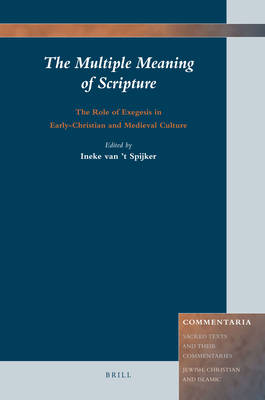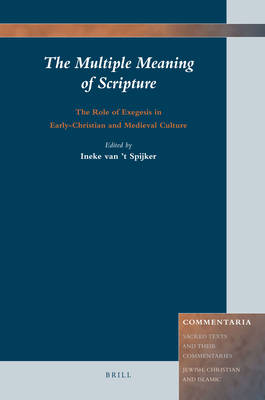
- Afhalen na 1 uur in een winkel met voorraad
- Gratis thuislevering in België vanaf € 30
- Ruim aanbod met 7 miljoen producten
- Afhalen na 1 uur in een winkel met voorraad
- Gratis thuislevering in België vanaf € 30
- Ruim aanbod met 7 miljoen producten
Zoeken
The Multiple Meaning of Scripture
The Role of Exegesis in Early-Christian and Medieval Culture
€ 297,95
+ 595 punten
Omschrijving
From the beginning of the Christian era and throughout the Middle Ages, biblical interpretation was the field where theological, philosophical and political matters were discussed. At the same time Scripture's interpretation required the exploration of hermeneutical positions about how a literal and a hidden meaning could be established and how they related to each other. Ranging from early-Christian concerns about the text of the Bible itself, via Carolingian biblical commentaries, and the ever more diverse interpretations from the twelfth century and onwards, to the literary implications of (Jewish) commentary, the articles in this volume examine biblical exegesis both as a discourse on theology, philosophy and politics, and as the context for discussions on its underlying interpretative principles.
Contributors are J. K. Kitchen, Katja Vehlow, Caroline Chevalier-Royet, Sumi Shimahara, Ian Christopher Levy, Pierre Boucaud, Elisabeth Mégier, Cédric Giraud, Wanda Zemler-Cizewski, Ineke van 't Spijker, Eva De Visscher, Alexander Fidora, Frans van Liere, and Robert A. Harris.
Contributors are J. K. Kitchen, Katja Vehlow, Caroline Chevalier-Royet, Sumi Shimahara, Ian Christopher Levy, Pierre Boucaud, Elisabeth Mégier, Cédric Giraud, Wanda Zemler-Cizewski, Ineke van 't Spijker, Eva De Visscher, Alexander Fidora, Frans van Liere, and Robert A. Harris.
Specificaties
Betrokkenen
- Uitgeverij:
Inhoud
- Aantal bladzijden:
- 344
- Taal:
- Engels
- Reeks:
- Reeksnummer:
- nr. 2
Eigenschappen
- Productcode (EAN):
- 9789004171848
- Verschijningsdatum:
- 17/12/2008
- Uitvoering:
- Hardcover
- Formaat:
- Genaaid
- Afmetingen:
- 160 mm x 240 mm
- Gewicht:
- 728 g

Alleen bij Standaard Boekhandel
+ 595 punten op je klantenkaart van Standaard Boekhandel
Beoordelingen
We publiceren alleen reviews die voldoen aan de voorwaarden voor reviews. Bekijk onze voorwaarden voor reviews.







